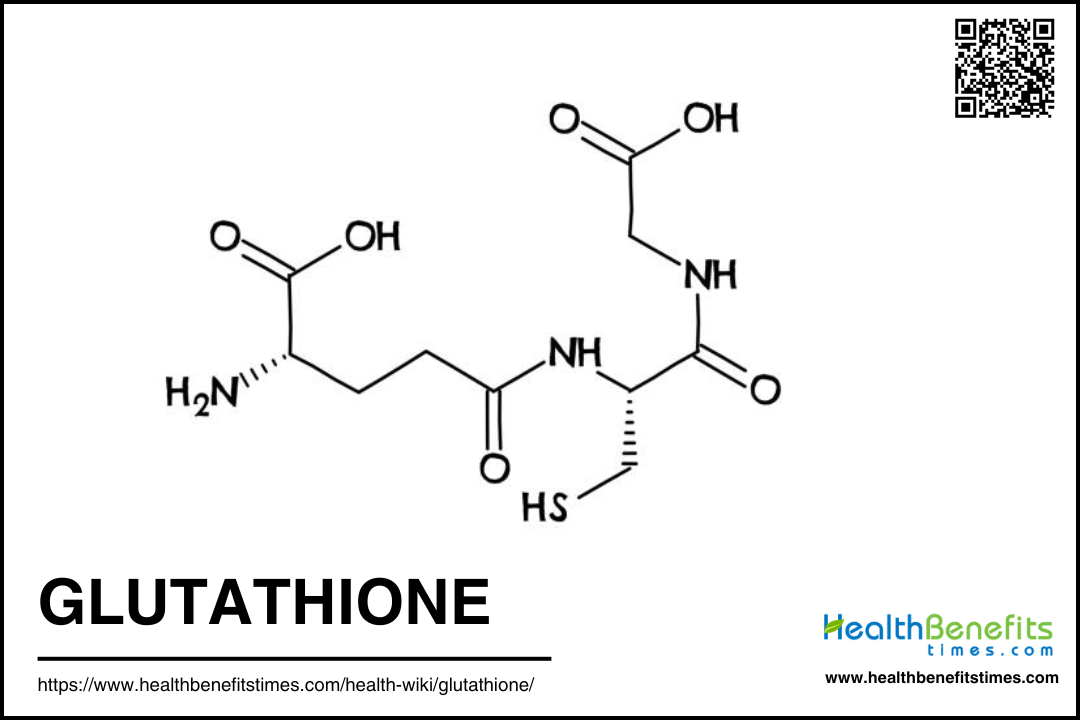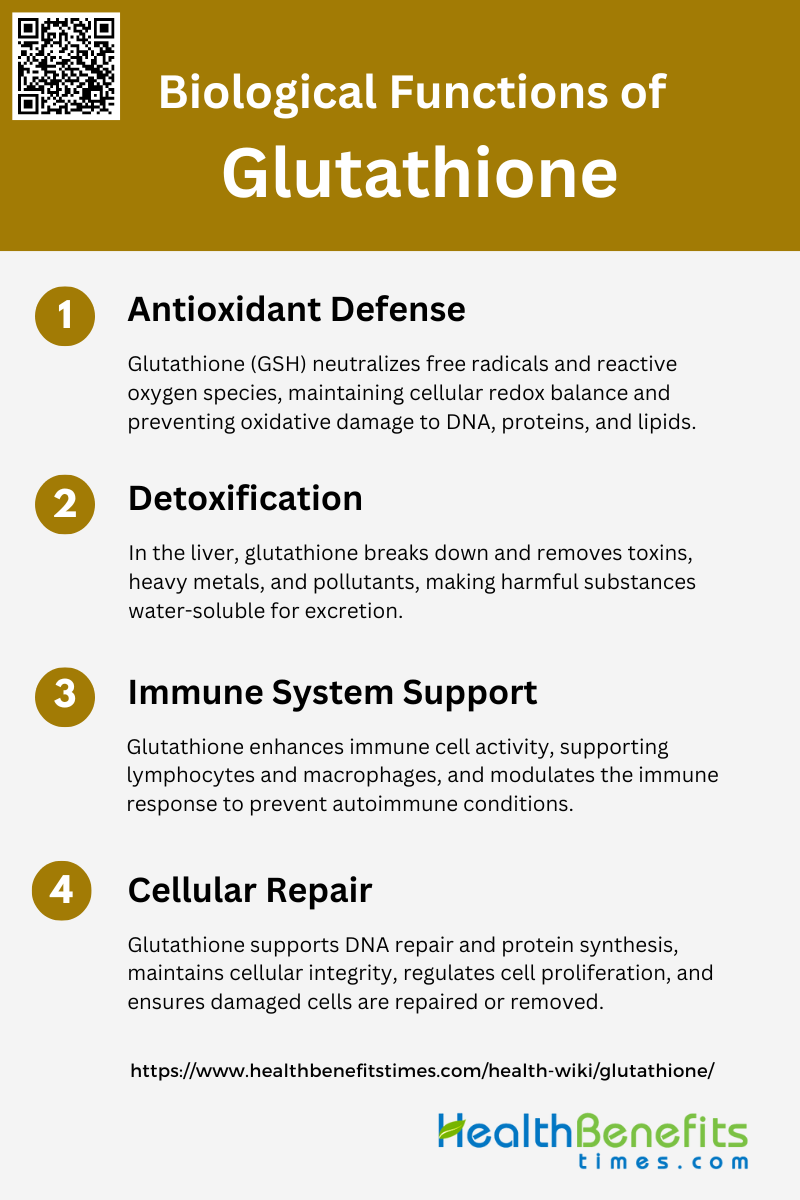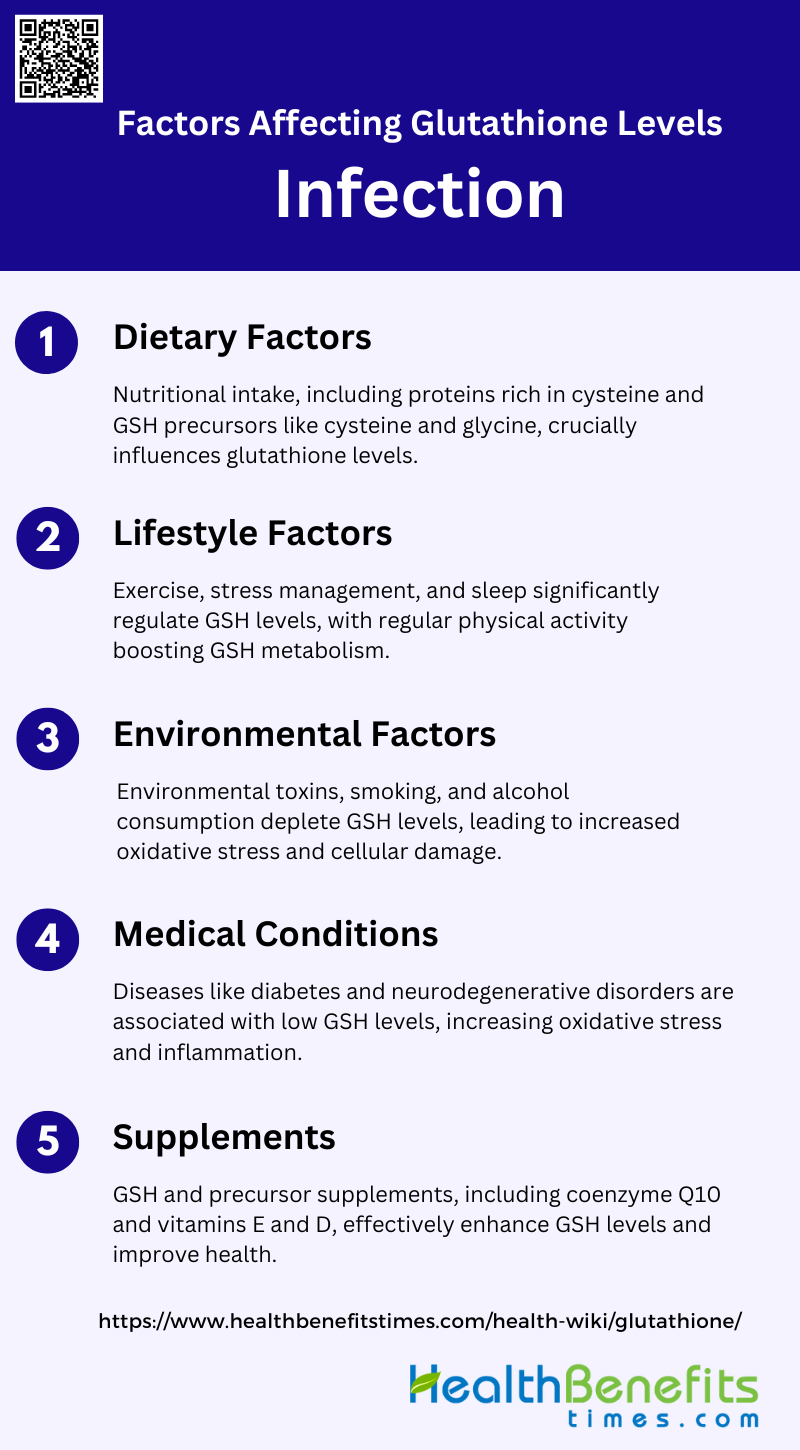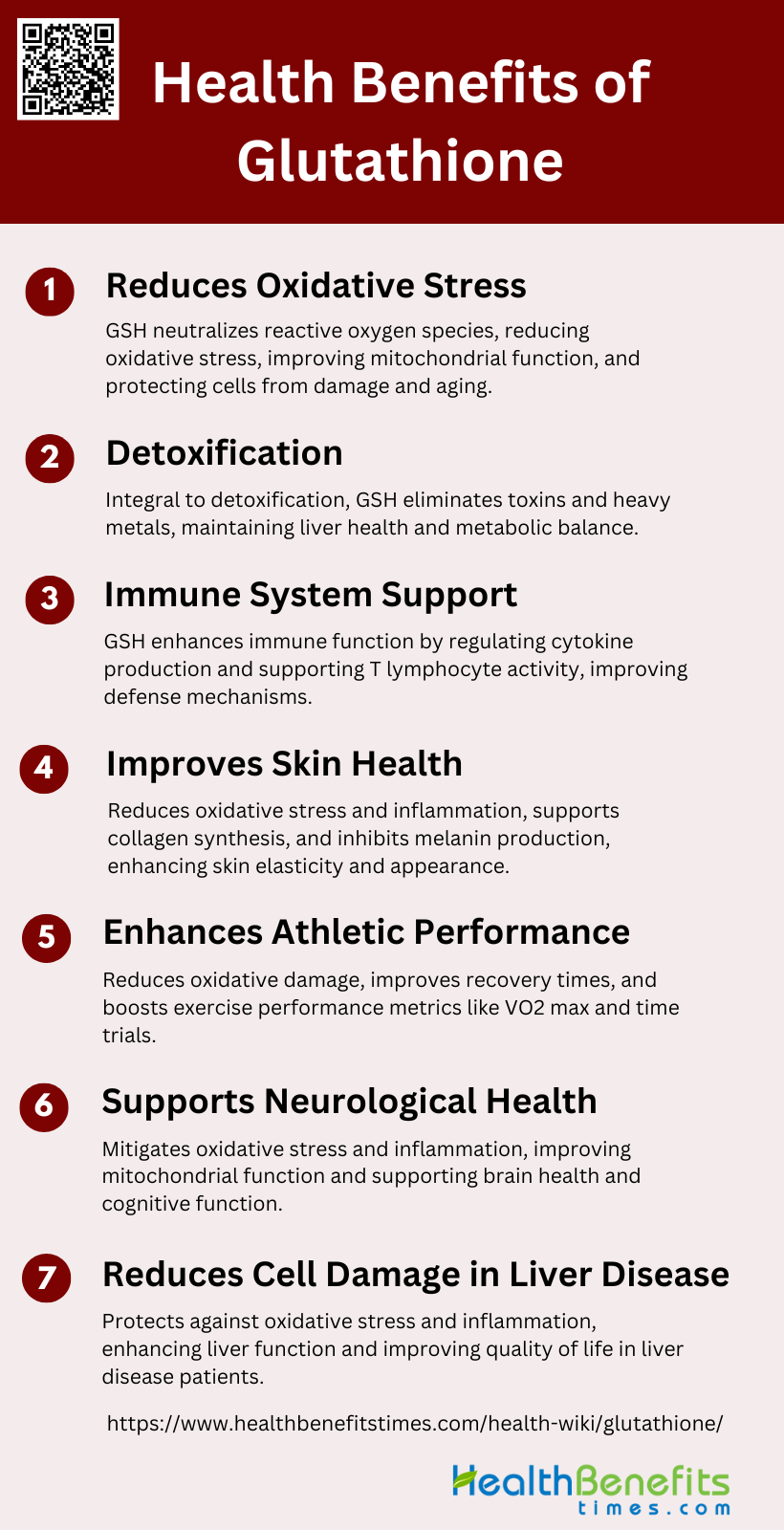Glutathione (GSH) is a powerful antioxidant composed of three amino acids: glutamine, cysteine, and glycine. It plays a crucial role in maintaining cellular redox balance, detoxifying harmful substances, and supporting immune function. GSH directly scavenges reactive oxygen species (ROS), such as hydrogen peroxide and free radicals, thereby protecting cells from oxidative stress and damage. It also serves as a cofactor for various enzymes, including glutathione peroxidases and glutathione-S-transferases, which are essential for detoxification processes. Additionally, glutathione is involved in the regulation of cellular processes such as DNA synthesis and repair, protein synthesis, and enzyme activation. Its levels can be influenced by diet, lifestyle, and certain medical conditions, making it a critical component of overall health and well-being.
Types of Glutathione
Glutathione, a powerful antioxidant, exists in various forms, each playing a unique role in maintaining cellular health. Understanding the different types of glutathione can help in selecting the right form for specific health needs. Below is a list of the primary types of glutathione and their benefits:
1. Reduced Glutathione (GSH)
Reduced Glutathione (GSH) is the most active and abundant form of glutathione in the body, playing a critical role in cellular defense against oxidative stress. It acts as a powerful antioxidant, neutralizing free radicals and reactive oxygen species, thereby protecting cells from damage. GSH is also involved in various metabolic processes, including the detoxification of harmful substances in the liver. Its ability to regenerate other antioxidants, such as vitamins C and E, further underscores its importance in maintaining cellular health. The balance between GSH and its oxidized form (GSSG) is crucial for cellular redox homeostasis and overall health.
2. Oxidized Glutathione (GSSG)
Oxidized Glutathione (GSSG) is the form of glutathione that results when GSH donates electrons to neutralize reactive oxygen species, becoming oxidized in the process. In healthy cells, the ratio of GSH to GSSG is tightly regulated, with GSH being the predominant form. An increased GSSG level indicates oxidative stress and a compromised antioxidant defense system. The enzyme glutathione reductase plays a key role in converting GSSG back to GSH, thus maintaining the cellular redox balance. Monitoring the GSH/GSSG ratio is often used as a biomarker for oxidative stress and overall cellular health.
3. Intravenous (IV) Glutathione
Intravenous (IV) Glutathione therapy involves the direct infusion of glutathione into the bloodstream, bypassing the digestive system for immediate absorption. This method is often used in medical and wellness settings to boost antioxidant levels rapidly. IV glutathione is touted for its potential benefits in treating various conditions, including Parkinson’s disease, liver diseases, and to enhance overall wellness. However, the scientific evidence supporting these claims is limited, and the therapy is not without risks, including potential infections and vein damage. Despite its popularity, especially in integrative and alternative medicine practices, more research is needed to substantiate its efficacy and safety.
Biological Functions of Glutathione
Glutathione is a crucial antioxidant that plays multiple roles in maintaining cellular health and function. It is involved in detoxification, immune system support, and protection against oxidative stress. Below is a list of the key biological functions of glutathione:
1. Antioxidant Defense
Glutathione (GSH) is a critical antioxidant that protects cells from oxidative stress by neutralizing free radicals and reactive oxygen species (ROS). It plays a central role in maintaining cellular redox balance and preventing oxidative damage to cellular components such as DNA, proteins, and lipids. The antioxidant properties of GSH are essential for cellular health and are implicated in the prevention of various diseases, including cancer, neurodegenerative disorders, and cardiovascular diseases.
2. Detoxification
Glutathione is heavily involved in the detoxification processes within the liver, where it helps in the breakdown and removal of toxins, heavy metals, and pollutants. It conjugates with harmful substances to make them more water-soluble, facilitating their excretion from the body. The detoxification role of GSH is crucial for protecting the body from environmental toxins and xenobiotics, thereby maintaining overall health and preventing disease.
3. Immune System Support
Glutathione enhances immune function by supporting the activity of various immune cells, including lymphocytes and macrophages. It helps in the proliferation and activation of these cells, thereby boosting the body’s ability to fight off infections and diseases. GSH also plays a role in modulating the immune response, ensuring that it is effective without being overly aggressive, which can lead to autoimmune conditions.
4. Cellular Repair
Glutathione aids in cellular repair processes by supporting DNA repair and protein synthesis. It helps in the maintenance and restoration of cellular integrity, which is vital for cell survival and function. GSH is also involved in the regulation of cell proliferation and apoptosis, ensuring that damaged cells are effectively repaired or removed, thereby maintaining tissue health and preventing the development of diseases.
Sources of Glutathione
Glutathione can be obtained from various dietary sources and supplements, each contributing to its levels in the body. Consuming foods rich in glutathione or its precursors can help maintain optimal health. Below is a list of common sources of glutathione:
1. Dietary Sources
Glutathione is a critical antioxidant found in various foods. Foods high in glutathione include spinach, avocados, asparagus, and okra. Consuming a diet rich in these foods can help maintain adequate glutathione levels. Additionally, foods rich in sulfur-containing amino acids, such as garlic, onions, and cruciferous vegetables (e.g., broccoli, Brussels sprouts), support glutathione synthesis in the body. To boost glutathione levels, it is also beneficial to include foods high in vitamins C and E, which help maintain glutathione in its active form.
2. Supplements
Glutathione supplements come in various forms, including oral, intravenous (IV), and sublingual. Oral supplements are less effective due to poor bioavailability, as they are broken down in the digestive tract. IV glutathione provides direct delivery into the bloodstream, offering higher bioavailability but is more invasive and costly. Sublingual forms have shown superior bioavailability compared to oral supplements, making them a promising alternative. However, the effectiveness of these supplements can vary, and combining them with precursors like N-acetylcysteine (NAC) and glycine can enhance their benefits.
3. Lifestyle Factors
Adequate sleep and regular exercise are crucial for maintaining optimal glutathione levels. Sleep helps the body repair and regenerate, which supports glutathione synthesis. Exercise, particularly moderate-intensity activities, can boost glutathione levels and reduce oxidative stress. Conversely, chronic stress can deplete glutathione levels, as it increases oxidative stress and inflammation in the body. Managing stress through relaxation techniques, such as meditation and deep breathing, can help maintain healthy glutathione levels.
Factors Affecting Glutathione Levels
Glutathione is influenced by various factors that can either enhance or deplete its levels. Understanding these factors is essential for optimizing health and preventing oxidative stress-related diseases. Here are some key elements that affect glutathione levels:
1. Dietary Factors
Dietary intake significantly influences glutathione (GSH) levels. Nutritional interventions, including amino acids, vitamins, minerals, and phytochemicals, can enhance circulating GSH levels, potentially translating to clinical benefits. For instance, dietary proteins rich in cysteine, such as alpha-lactalbumin, have been shown to acutely stimulate liver GSH synthesis during exercise. Additionally, supplementation with GSH precursors like cysteine and glycine can restore GSH synthesis and concentrations, particularly in elderly individuals, thereby reducing oxidative stress and damage. Overall, a balanced diet rich in specific nutrients is crucial for maintaining optimal GSH levels.
2. Lifestyle Factors
Lifestyle factors such as exercise, sleep, and stress management play a pivotal role in regulating GSH levels. Regular physical activity has been shown to influence GSH metabolism positively. For example, GSH supplementation can improve muscle metabolism and reduce fatigue during prolonged exercise. Conversely, chronic stress and aging can lead to a decline in GSH levels, particularly in the brain, increasing susceptibility to oxidative stress and related diseases. Effective stress management and adequate sleep are essential to maintain GSH homeostasis and protect against oxidative damage.
3. Environmental Factors
Exposure to environmental toxins, smoking, and alcohol consumption can significantly impact GSH levels. Environmental toxins and reactive chemicals can compromise GSH homeostasis, leading to increased oxidative stress and cellular damage. Smoking and alcohol consumption are known to deplete GSH levels, further exacerbating oxidative stress and increasing the risk of various diseases. Therefore, minimizing exposure to environmental toxins and avoiding smoking and excessive alcohol consumption are critical for maintaining healthy GSH levels and reducing oxidative stress.
4. Medical Conditions
Various medical conditions can affect GSH levels. Diseases such as diabetes, cardiovascular diseases, and neurodegenerative disorders are associated with low plasma GSH levels, which contribute to increased oxidative stress and inflammation. Additionally, aging is linked to a decline in GSH synthesis, leading to higher oxidative stress and damage. Supplementation with GSH precursors and other dietary supplements can help improve GSH levels and mitigate the adverse effects of these medical conditions.
5. Supplements
Supplementation with GSH and its precursors can effectively enhance GSH levels. Studies have shown that sublingual GSH supplementation is superior to oral GSH and N-acetylcysteine (NAC) in increasing plasma GSH levels and improving oxidative stress markers. Other supplements, such as coenzyme Q10, selenium, curcumin, omega-3 fatty acids, and vitamins E and D, have also been found to enhance plasma GSH levels and improve cardiometabolic health in patients with diabetes. Therefore, targeted supplementation can be a valuable strategy for optimizing GSH levels and promoting overall health.
Health Benefits of Glutathione
Glutathione plays a crucial role in maintaining overall health. It helps neutralize free radicals, supports the immune system, and detoxifies the liver. Here are some of the key health benefits of glutathione:
1. Reduces Oxidative Stress
Glutathione (GSH) plays a crucial role in reducing oxidative stress by neutralizing reactive oxygen species (ROS) and maintaining cellular redox balance. Studies have shown that GSH deficiency contributes significantly to oxidative stress, which is implicated in aging and various diseases such as Alzheimer’s and Parkinson’s. Supplementation with GSH or its precursors, such as N-acetylcysteine (NAC), has been demonstrated to lower oxidative stress levels, improve mitochondrial function, and enhance overall cellular health. This antioxidant property of GSH is essential for protecting cells from damage and maintaining physiological functions.
2. Detoxification
Glutathione is integral to the body’s detoxification processes. It participates in the conjugation and subsequent elimination of toxins, including heavy metals and carcinogens, through the action of glutathione S-transferases (GSTs). In a study on grass carp, dietary GSH improved detoxification functions and resistance to oxidative stress induced by microcystins, highlighting its role in enhancing the body’s ability to manage and expel harmful substances. This detoxification capability is vital for maintaining liver health and overall metabolic balance.
3. Immune System Support
Glutathione supports the immune system by regulating cytokine production and enhancing the function of immune cells such as T lymphocytes. Research indicates that GSH levels influence the immune response, with deficiencies leading to impaired immune function and increased susceptibility to infections. Supplementation with GSH or its precursors has been shown to improve immune parameters, such as increasing the levels of CD4+ and CD8+ T cells, thereby bolstering the body’s defense mechanisms.
4. Improves Skin Health
Glutathione is known for its skin health benefits, particularly its ability to reduce oxidative stress and inflammation, which are key factors in skin aging and damage. GSH helps in maintaining skin elasticity and reducing wrinkles by neutralizing free radicals and supporting collagen synthesis. Additionally, it has been used in dermatology for its skin-lightening effects, as it inhibits melanin production. These properties make GSH a valuable component in skincare and anti-aging treatments.
5. Enhances Athletic Performance
Athletes and individuals engaged in intense physical activities often experience increased oxidative stress. Glutathione supplementation has been shown to enhance athletic performance by reducing oxidative damage and improving recovery times. Studies have demonstrated that NAC, a precursor to GSH, can significantly improve exercise performance metrics such as VO2 max and time trials in individuals with low baseline GSH levels. This improvement is attributed to the antioxidant properties of GSH, which help in maintaining muscle function and reducing fatigue.
6. Supports Neurological Health
Glutathione plays a protective role in neurological health by mitigating oxidative stress and inflammation, which are implicated in neurodegenerative diseases like Alzheimer’s and Parkinson’s. GSH deficiency is associated with increased oxidative damage in neuronal cells, leading to cognitive decline and other neurological issues. Supplementation with GSH or its precursors has been shown to improve mitochondrial function and reduce oxidative stress, thereby supporting brain health and cognitive function.
7. Reduces Cell Damage in Liver Disease
Glutathione is critical for liver health, particularly in conditions involving oxidative stress and inflammation, such as hepatocellular carcinoma. Studies have shown that GSH supplementation can ameliorate liver function, reduce oxidative stress, and decrease inflammatory markers in patients undergoing interventional therapy for liver cancer. By enhancing the liver’s detoxification capacity and protecting against cellular damage, GSH helps in maintaining liver function and improving the quality of life for patients with liver disease.





